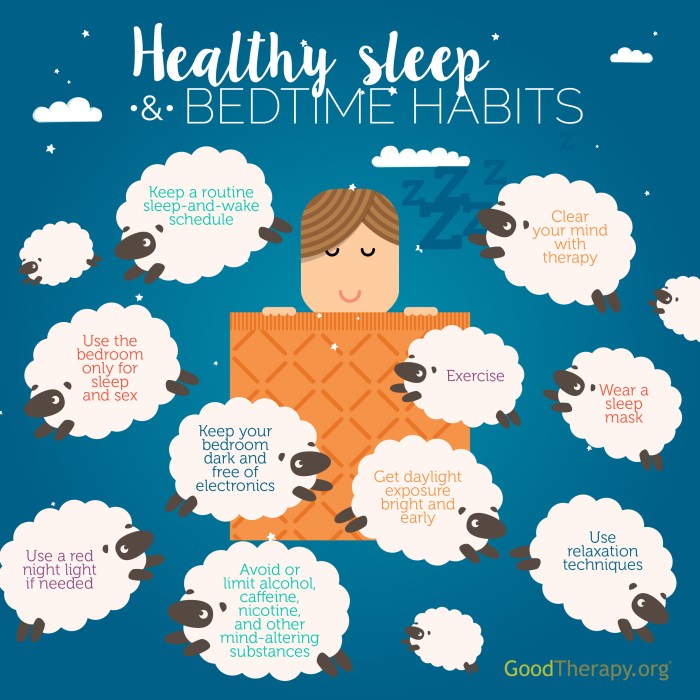Embark on a journey towards better sleep with our guide on How to Get a Good Night’s Sleep in 5 Easy Steps, exploring the importance of quality sleep and strategies for creating an optimal sleep environment.
Learn about the benefits of establishing a bedtime routine and discover simple yet effective ways to improve your sleep quality.
Importance of Quality Sleep

Getting a good night’s sleep is crucial for overall health as it plays a significant role in various bodily functions and processes.
Impact of Poor Sleep on Mental and Physical Well-being
Poor sleep can have detrimental effects on both mental and physical well-being, leading to a range of health issues.
- Increased risk of chronic conditions such as heart disease, diabetes, and obesity.
- Impaired cognitive function, affecting memory, concentration, and decision-making.
- Weakened immune system, making the body more susceptible to illness.
- Elevated stress levels and mood disturbances, including anxiety and depression.
Prevalence of Sleep Disorders and Their Consequences
Sleep disorders are more common than many realize, impacting a significant portion of the population and leading to various consequences.
- Approximately 50 to 70 million adults in the US have a sleep disorder.
- Insomnia affects around 30% of adults at some point in their lives.
- Sleep apnea, a common disorder, is linked to hypertension, heart disease, and stroke.
- Narcolepsy, a neurological disorder, can result in excessive daytime sleepiness and sudden sleep attacks.
Creating a Sleep-Inducing Environment

Creating a sleep-inducing environment is crucial for achieving a restful night’s sleep. By setting up a comfortable and relaxing space, you can improve your sleep quality significantly.
Keep the Bedroom Dark, Quiet, and Cool
- Avoid bright lights and use blackout curtains to block out any external light that can interfere with your sleep cycle.
- Eliminate noise distractions by using earplugs or a white noise machine to create a quiet environment conducive to sleep.
- Keep the room temperature cool, ideally between 60-67 degrees Fahrenheit, to promote better sleep as our body temperature naturally drops during sleep.
Utilize Calming Scents
- Consider using essential oils like lavender, chamomile, or jasmine in a diffuser to create a relaxing atmosphere in your bedroom.
- Lavender, in particular, has been shown to have calming effects and can help reduce anxiety and stress, promoting a more restful sleep.
- Experiment with different scents to find the one that works best for you and helps you unwind before bedtime.
Establishing a Bedtime Routine

Having a consistent bedtime routine can significantly improve the quality of your sleep. It helps signal to your body that it’s time to wind down and prepare for rest, leading to a smoother transition into a peaceful night’s sleep.
Activities to Signal Sleep Time
- A warm bath or shower: The change in body temperature can help relax your muscles and calm your mind.
- Reading a book: Engaging in a calming activity like reading can help ease your mind and reduce stress.
- Practicing relaxation techniques: Techniques such as deep breathing, meditation, or gentle stretching can help prepare your body for sleep.
Avoiding Screens and Stimulating Activities
Engaging with screens before bedtime, such as smartphones, tablets, or computers, can disrupt your body’s natural sleep-wake cycle. The blue light emitted by screens can suppress the production of melatonin, the hormone that regulates sleep. It’s essential to avoid stimulating activities like vigorous exercise or intense work right before bed, as they can increase alertness and make it harder to fall asleep.
Summary

Take charge of your sleep health by implementing these easy steps and witness the positive impact on your overall well-being. Say goodbye to restless nights and hello to rejuvenating sleep.